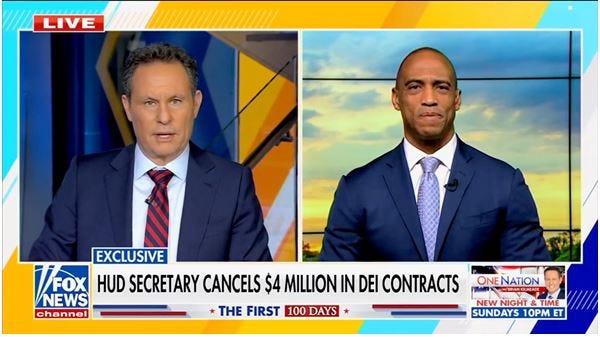Let’s not mince words here.
Last week, new Housing and Urban Development Secretary Scott Turner went on Fox & Friends and declared: “DEI is dead at HUD.” And just yesterday, the administration revoked an Obama/Biden era policy that required municipalities to track an report on housing segregation to receive federal funds.
As part of Trump’s agenda to dismantle governmental support for vulnerable people, HUD—which administers programs like Section 8 providing subsidized housing for over a million people—is now in their crosshairs. Their first target, of course, is DEI programs.
I want to be abundantly clear that Diversity, Equity, and Inclusion programs are critical to American claims of freedoms, liberty, and justice for all in every sector. But perhaps more than any other sector—save for perhaps law enforcement and broader criminal “justice”—housing is the primary battleground for combatting discrimination and historic disinvestment.
Through explicit and recorded processes like racial covenants, restrictive zoning, redlining, eminent domain, and denial of opportunities afforded white homebuyers (including the GI Bill and other low-interest loans) our country spent the century after the abolition of slavery ensuring that Black Americans were limited on where they could live, and what level of participation they were afforded politically and economically in the places they did live. Once this public and de facto segregation determined who was allowed to live where, economic and socio-political investments in the form of jobs, good schools, and other opportunities were allocated primarily to the white communities and withheld elsewhere.
This century-long, deliberate policy around housing created the realities we now observe: that homelessness disproportionately affects BIPOC individuals, especially those who are Black and/or Indigenous; that homeownership is 74% for white households and only 46% for Black households; that white households hold 84% of America’s wealth, and on average Black households have $1 million less wealth than white households (wealth being primarily accumulated and passed on generationally through property and land ownership.)
To be clear: racial discrimination in housing has been illegal for over 60 years. (It persists, of course, but is harder to do in the open.) But after centuries of slavery, and a full century of outright housing discriminations, simply outlawing the process will never bring us to equity. If you are holding a foot-race, and two-thirds of the competitors are allowed to start a full minute before the other racers, chances are likely that those who had the minute-long advantage will not only maintain their lead but build it. If you only look at the race after the first minute, you can argue that everyone has the same chance to run the race, but in the entire context this is patently false.
Said another way: if I waved a magic wand tomorrow and eliminated racism from every person’s heart from now until forever, we would still have these inequities in perpetuity. All things being equal now does nothing to undo or mitigate the clear and intentional harm done in the past. Without DEI policies that intentionally undo what was intentionally done, things will stay exactly the same as they are or worsen. (In fact, the homeownership statistic I quoted above is actually worse than in 1960, prior to the passing of the Fair Housing Act.)
DEI programs—in HUD and everywhere else—exist to remake a world that was intentionally made to benefit wealth accumulation for white people. If we don’t have DEI, we have entrenched white supremacy. By declaring “DEI is dead at HUD”, Scott Turner has implicitly said, “White Supremacy in housing and wealth-building is back to being the law of the land.”
We can’t let it stand.
These posts will always be free.
But the rest of my work—traveling to speak and lead workshops, creating content, advocacy and direct aid—is enabled and expanded by your support. Consider becoming a Paid subscriber to enhance my reach.





I will cry i will throw up i hate this
Kevin, as always, thank you for your moral clarity. I am especially grateful for your framing of "intentionally undo[ing] what was intentionally done." This is so very helpful to explain the continued need for DEI programs in the pursuit of justice.